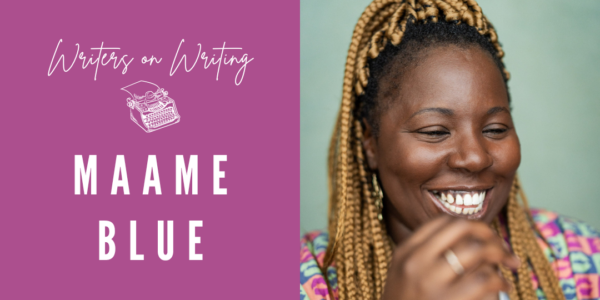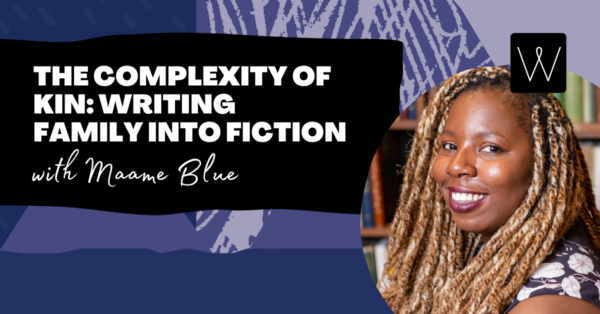
Writers on Writing is our regular conversation with a writer or industry professional about the writing craft, industry insights, and their own practice. This week, we spoke to novelist Maame Blue about writing familial relationship and multiple points of view in her books, ahead of her online workshop The Complexity of Kin: Writing Family into Fiction.
In your upcoming novel The Rest of You, you not only have the viewpoints of four different characters, but also explore their past, present and future across different countries. Is it a challenge to balance a novel between multiple interwoven characters and their perspectives?
I think it can be a challenge to balance multiple perspectives within any story, and the place I usually start is by really getting to know my characters. Writing each of them into different scenarios helps me understand their voice, their choices and their motivations much more. With The Rest Of You, I spent a lot of time writing around different points in the plot from each character’s perspective, one at a time. So that by the time I was interweaving the narrative, each character’s viewpoint felt clearer, which eventually made the story stronger.
Can it be hazardous to draw too much on one’s own family when writing fictional family narratives?
It can be difficult to disentangle ourselves from our own stories, or stories we’ve heard from those close to us. I always find it useful when writing something inspired by real life, to focus on the feelings involved; that means using my lived experience as a jumping-off point. I think we can get into a tricky space when we use people that we know in our writing, and make inferences about how they might have felt in a real life scenario. If writing about one’s own family, stick to your own feelings in that situation. Or if you’re writing an elder family member’s story, spend time with them, interview them, and make sure they’re happy with the perspective. And always ask yourself why you’re telling the story in the first place.
Your first novel Bad Love tells stories of romantic relationships – what different challenges does writing about familial relationships bring?
With romantic relationships, there is a common language and framework that the majority of us can understand, so it’s almost easier to stick to those when writing about romantic relationships beginning or ending. Writing about family is complex because there are multiple layers to contend with: history, role in the family, closeness or distance, and personhood. All of these things come into play in a family dynamic, and you can never really ‘break up’ with family, even if you no longer engage with them on the day to day. Instead, I find it useful to focus on one element of the family story and go from there, e.g. How is this one person in the family affected by the dynamics? What has their upbringing been like? How do they feel about family systems as an adult (if the character is an adult)? I love asking questions!
What’s your best tip for creating and developing a central character in a novel with multiple viewpoints?
First you must understand what their motivations are; what drives them forward in life, what do they want at the point at which we join their story, and what is their endgame? How do we get them from A to B? Once I know where my central character begins and ends, I find it much easier to add in those other viewpoints as the narrative goes on, because I can map where it is most relevant for them to intervene in the story.
What books would you recommend for excellent examples of writing about family?
A few of my favourites, which we will also be using in my workshop, are Son of Sin by Omar Sakr, When We Were Birds by Ayanna Lloyd Banwo and Somebody Loves You by Mona Arshi.
Maame Blue is a Ghanaian-Londoner, creative writing tutor and author of the novel Bad Love, which won the 2021 Betty Trask award, and was shortlisted for the Betty Trask Prize. Her short stories have been published in Not Quite Right For Us (Flipped Eye Publishing), New Australian Fiction 2020 (Kill Your Darlings), and Joyful, Joyful (Pan Macmillan). Maame is a recipient of the 2022 Society of Authors Travelling Scholarship and was a 2022 POCC Artist-in-Residence.
Maame contributes regularly to Royal Literary Fund publication Writers Mosaic and her writing has appeared in many places including Refinery29, The Independent and iNews. She co-hosted the Storymix podcast Craft & Conversation, and teaches creative writing for literary organisations including City Lit, Spread the Word, Arvon, Faber Academy UK and Australia, and Writing NSW. Her second novel The Rest Of You will be published in October 2024.
Enrol now in The Complexity of Kin: Writing Family into Fiction with Maame Blue, Monday 24 June 2024, 6-9pm online (via Zoom)
If you want to be the first to read great advice, prompts and inspiration from our incredible tutors, subscribe to our weekly e-newsletter Newsbite.
More from Writing NSW
Check out our full range of writing courses in Sydney, our online writing courses and our feedback programs to see how we can help you on your creative writing journey. Find out about our grants and prizes, as well as writing groups across NSW, and sign up to our weekly newsletter for writing events, opportunities and giveaways.

